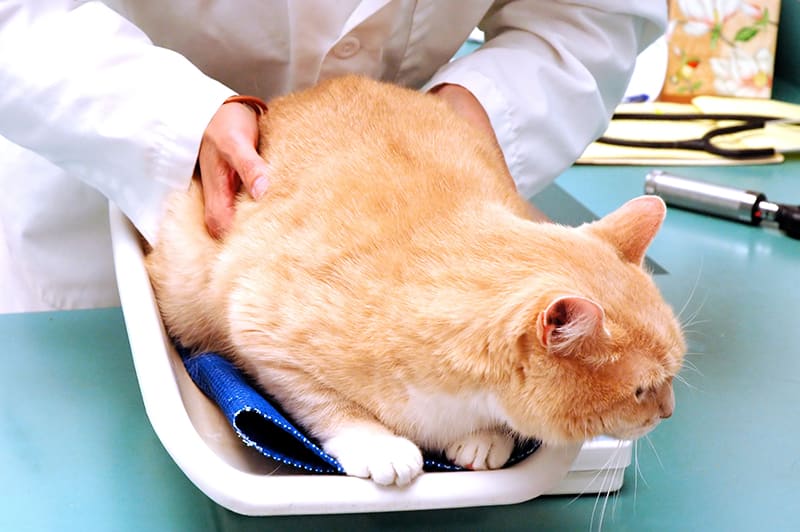Why Your Cat's Weight Is Important
Your cat's weight is likely not something you worry about, but weight is an important element of your cat's overall health.
Much like people, when your cat is carrying extra weight their risk of developing some serious and potentially life-threatening conditions increases dramatically. As little as a few excess ounces can have a significant effect on your cat's vitality and overall health.
Health Risks For Overweight Cats
If your feline friend is carrying extra weight they face an increased risk of developing one or more of the serious conditions listed below:
- Diabetes
- Arthritis
- Urinary tract infections
- Joint pain
- Chronic inflammation
- Skin problems
How To Tell If Your Cat Is Overweight
Struggling to Jump
- A cat's body is perfectly designed for jumping. If it takes multiple tries for your cat to jump up onto their favorite piece of furniture, or if your cat gives up altogether, their weight could be the issue.
Check for Your Cat's Waistline
- While your cat is standing, look down at them from directly above. Try to spot a slight indent just above your cat's hips where their waist should be (this can be a bit tricky with long-haired cats). If you can't see their waist or if their sides are bulging it means that your kitty is probably carrying excess weight.
Feel for Your Cat's Ribs
- If your feline friend is at their correct weight you should be able to feel their ribs by running your hand along their chest. If you can't feel your cat's ribs, your cat may be overweight.
Use Our Overweight Cat Chart
- Look over the overweight cat chart below to get a better understanding of your cat's weight category, and whether your cat may be carrying an extra pound or two.

How to Get Your Kitty's Weight Back On-track
Your kitty's breed, age, and lifestyle all make a significant difference to their nutritional needs.
If you think that your cat may be overweight make an appointment to see your vet. Your veterinarian will assess your cat's current weight then let you know what your kitty's optimal weight is and how to help your cat reach their weight loss goals.
For cats that are just a little overweight, sticking to their regular food but reducing the size of each meal could get your pet's weight back within healthy parameters.
If your cat needs to lose a significant amount of weight, it may be best to switch your kitty over to a specialized food that is formulated to help with feline weight loss.
Unexplained Weight Gain
Has your cat has suddenly started to gain weight without cause? Then it's time to see your vet! Unexplained weight gain can be a symptom of an underlying health issue.
Note: The advice provided in this post is intended for informational purposes and does not constitute medical advice regarding pets. For an accurate diagnosis of your pet's condition, please make an appointment with your vet.
Is your cat overweight? Contact our Clemmons vets to book an appointment for your feline friend. We can examine your kitty for any underlying health conditions and recommend ways to help get your cat's weight back to a healthier level.
Looking for a vet in
Clemmons?
We're always accepting new patients, so contact our veterinary hospital today to book your pet's first appointment.
Related Articles View All
How often do you take a cat to the vet?
Regular checkups including vaccines and parasite control play a key role in helping your kitty achieve a long and healthy life. So, how often should you take a cat to the vet? Today we share general guidelines recommended by most veterinarians.
Exploring Cat Dental Health - Gingivitis
Is your cat refusing to eat, or losing weight? It could be due to a dental health problem such as gingivitis. Read on to learn about the signs and how gingivitis in cats can be treated.
The Best Way to Travel With a Cat
Planning a trip away from home and want to take your feline friend along with you? Here are a few helpful tips from our Clemmons team to help make the journey an enjoyable experience for both you and your cat.
Kitten First Vet Visit - What to Expect & What it Will Cost
Have you welcomed a beautiful new kitten into your heart and home? If so, early veterinary care can help to set your tiny fur baby on the path to excellent life-long health. Today, our Clemmons vets discuss kitten first vet visits.
How to Tell if Your Cat Has a Broken Leg
Regardless of whether your cat is a curious outdoor explorer or a chilled-out homebody, accidents can happen. Today, our Clemmons vets share signs that may indicate that your cat has a broken leg, and what you should do.

